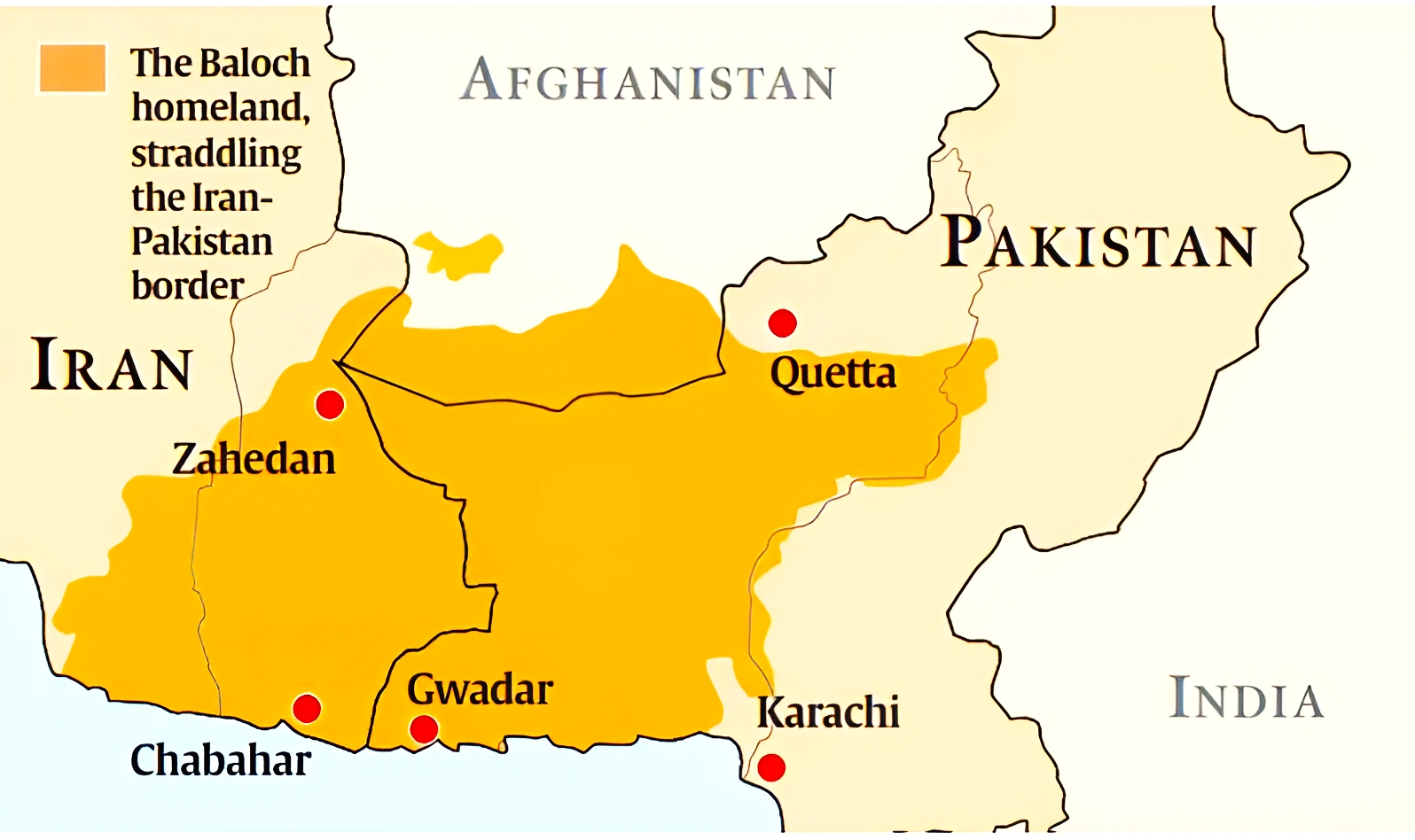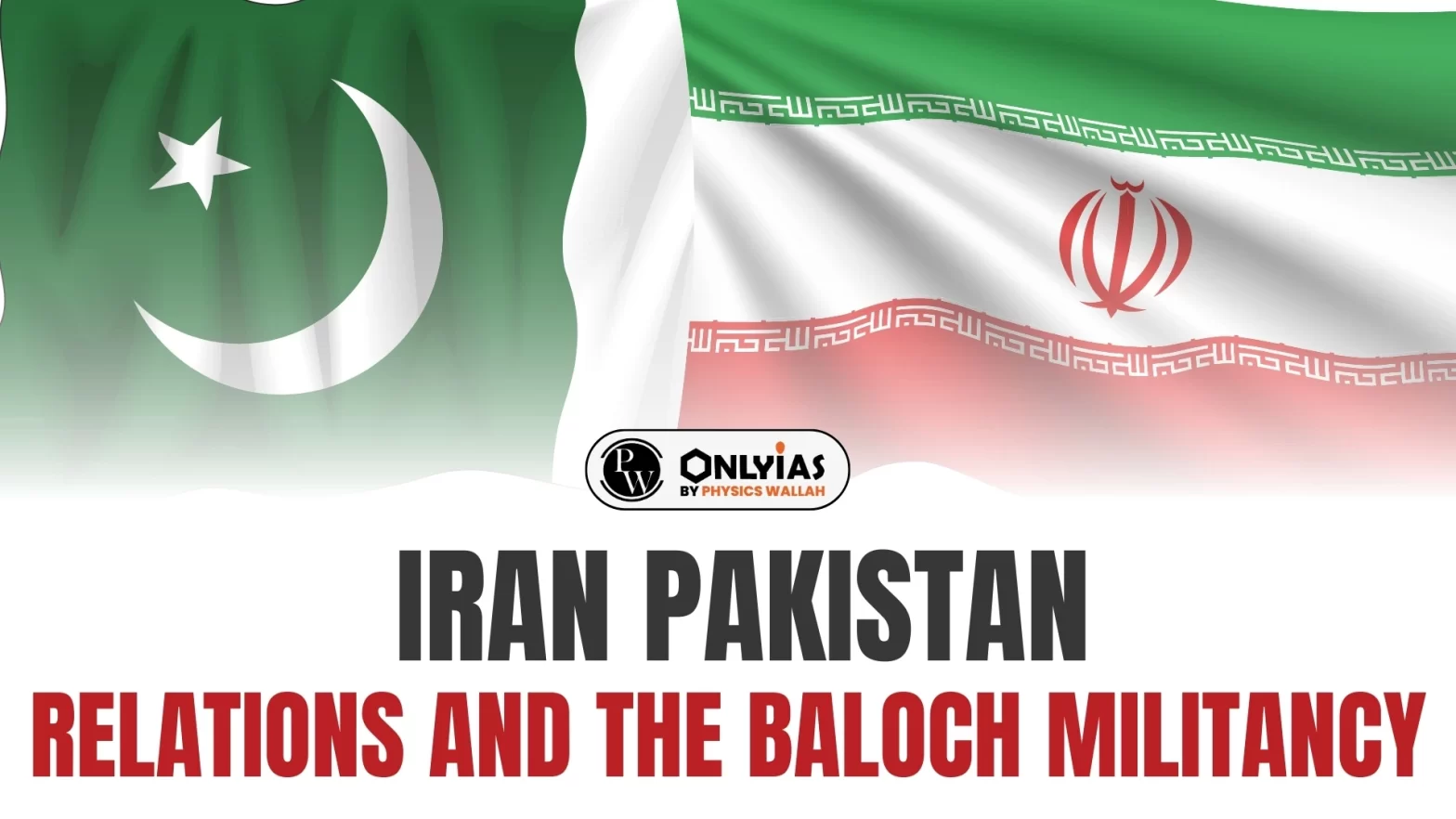Context:
This editorial is based on the news “Explained: Iran, Pakistan, and the Baloch militancy” which was published in Indian Express. Recent missile strikes, drone attacks, and territorial disputes between Iran and Pakistan bought them into the spotlight.
| Relevancy for Prelims: Iran-Pakistan Crisis In Balochistan, Iran Pakistan Border, Goldsmith Line, Baghdad Pact, NATO, and Taliban.
Relevancy for Mains: Iran Pakistan Relations and impact on India. |
About Iran Pakistan Relations and Baloch Angle
-
Strong Relationship Between Iran and Pakistan:
- Allies: Before the 1979 Islamic Revolution in Iran, both countries were firmly allied to the US and had, in 1955, joined the Baghdad Pact, later known as the Central Treaty Organization (CENTO), a military alliance modeled on NATO.
- Support during War: Iran provided material and weapons support to Pakistan during its 1965 and 1971 wars against India and even after the liberation of Bangladesh, the Shah of Iran said that he would not tolerate “further disintegration” of Pakistan.
-
Emerging of Differences Between Iran and Pakistan:
- US Factor: Since 1979, there has been major Iranian distrust of Pakistan, which increased after 9/11 as Islamabad extended unqualified support to the US “War on Terror”.
- Different Strategic Ties: Iran’s post-1979 foreign policy focus on exporting the revolution made its Arab neighbors uneasy and Pakistan’s continued strategic ties with these Arab kingdoms impacted its relationship with Iran.
- Afghanistan Factor: Pakistan and Iran ended up on opposite sides in Afghanistan after the withdrawal of Soviet forces.
- Iran backed the Northern Alliance against the Taliban, a Pakistani creation and almost entered the war in 1998.
-
Attempts at Reconciliation:
- In 1995: Pakistan PM Benazir Bhutto called Iran “a friend, a neighbor and a brother in Islam”, started importing gas, emphasized cooperation and regretted US sanctions.
- In 2013: Zardari’s presidency saw increased cooperation with Iran, especially in trade and energy. In 2013, the Iran-Pakistan gas pipeline project received approval.
- However, in June 2013, under the presidency of Nawaz Sharif, deviation in relations was observed and the Iran pipeline project remains incomplete.
-
Common Baloch Problem:
- Sharing Border: The 909-km Iran Pakistan border, known as the Goldsmith Line, stretches from a tripoint with Afghanistan to the northern Arabian Sea. Roughly 9 million ethnic Baloch live on either side of the line.

-
- Sharing Links: The Baloch share cultural, ethnic, linguistic, and religious links that transcend modern borders.
- A Minority Group: Both in Pakistan and Iran, the Baloch are an ethnic minority.
- The Baloch homeland is rich in natural resources but impoverished. In Iran, 80% of the Baloch population lives under the poverty line and are also living a poor life in Pakistan.
-
The Insurgent and Attacking Issues:
- Beginning of Baloch Nationalism: Baloch nationalism began in the early decades of the 20th century, when new international borders came to be drawn in the region.
- Separatist Movement: Their marginalization in both countries in subsequent years fuelled several separatist movements for a “Greater Balochistan” nation state.
- Stress on Relations: The insurgents travel across the porous border, attacking targets, complicating relations by accusing each other of harboring and supporting terrorists.
- Basis of Organization: Baloch insurgents in Iran are often organized on Sunni religious lines, whereas in Pakistan, they are more secular ethno-nationalist.
About India Iran Relations
- Strong Ties: India’s ties with Iran have developed stronger and they have cooperated in the energy sector, despite the US sanctions on Iran.
- Infrastructure Development: India has been involved in the planning and building of the Chabahar port. Chabahar directly competes with Pakistan’s Gwadar port.
- On Terror: India has an uncompromising position of zero tolerance towards terrorism.
- India has long maintained that Pakistan harbors terrorists. Iran is simply making the same claim that India had a similar justification for the Balakot surgical strikes of 2019.
- Pakistan’s retaliatory strikes were intended to send a message to India too and Pakistan hopes to possibly deter India from carrying out future cross-border attacks.
Conclusion
The recent strikes by both sides from Iran and Pakistan seem to have been intended as warning shots to deter their enemies from fomenting trouble in their respective territories.
Also Read:
![]() 20 Jan 2024
20 Jan 2024

